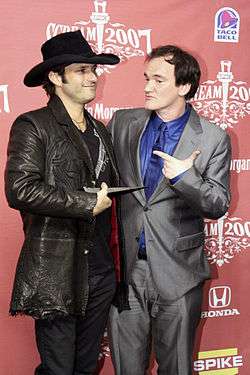A Band Apart
A Band Apart Films was a production company founded by Quentin Tarantino, Michael Bodnarchek, and Lawrence Bender that was active from 1991 to 2006. Its name is a play on the French New Wave classic, Bande à part ("Band of Outsiders") by filmmaker Jean-Luc Godard, whose work was highly influential on the work of the company's members. Thanks in part to the popularity of Quentin Tarantino's and Robert Rodriguez's films, the company quickly gained cult-like status within Hollywood.
 | |
| LLC | |
| Industry |
|
| Founded | 1991 |
| Founders |
|
| Defunct | 2006 |
| Headquarters |
|
Key people | |
| Products |
|
| Website | abandapart |
History

Tarantino formed A Band Apart in 1991,[1] naming it after his favorite Godard film, Bande à part.[2] The company's logo was a stylized image of the robbers from Reservoir Dogs, Tarantino's debut film. Subsequently, several legal entities within the company were named after the film's characters. Mr. Pink LLC was for music video production budgets, and Mr. Brown LLC was for commercials.
In addition to Tarantino, members of the company included Robert Rodriguez, John Woo, Tim Burton, Steve Buscemi, Darren Aronofsky, John Landis, Joseph McGinty Nichol, Nigel Dick, Steve Carr, Cameron Casey, Marcel Langenegger, Wayne Isham, Terry Windell, Lisa Prisco, Phil Harder-Rick Fuller, Coodie & Chike, Osbert Parker, Luc Besson, Adam Christian Clark, André 3000, Christopher Morrison and Michael Palmieri, Andy Mornahan, Steve Lowe, Loren Hill, Darren Grant, Charles Whittenmier, Geoff McGann, Olivier Venturini, The 405 Guys, Craig Tanamoto.
The company catapulted to fame with the 1994 release of Tarantino's Pulp Fiction, which was considered by some critics to be the most influential American film of the decade.[3] In the summer of 1995, the company added a division for commercials and later, for music video production, adding a third co-owner Michael Bodnarchek. Kristin Cruz (aka Kris Foster) and Heidi Santelli launched A Band Apart Music Videos as Directors' Rep and Executive Producer, respectively. [4]
Company closure
Tarantino and Bender are no longer working together and Tarantino is the sole owner of A Band Apart Films.[5] David Heyman (Harry Potter, Gravity) produced Tarantino's 9th film Once Upon a Time in Hollywood.[6]
While the company is listed as studio for Tarantino's 2009 Inglourious Basterds and 2012 Django Unchained,[7][8] and credited in the 2007 Grindhouse movies, it is unclear whether the company was reformed for the films or was credited for involvement in pre-2006 production of those films.
Movies and TV shows produced
- Reservoir Dogs (1992)
- True Romance (1993)
- Pulp Fiction (1994)
- The Whiskey Heir (1995)
- White Man's Burden (1995)
- Four Rooms (1995)
- Curdled (1996)
- From Dusk till Dawn (1996)
- Jackie Brown (1997)
- Good Will Hunting (1997)
- Metallica: Cunning Stunts (1998)
- From Dusk Till Dawn 2: Texas Blood Money (1999)
- From Dusk Till Dawn 3: The Hangman's Daughter (2000)
- Kite + Kill Bill + BNL (2008, Pixar RenderMan)
- Kill Bill: Volume 2 (2004)
- Dirty Dancing: Havana Nights (2004)
- Death Proof (2007, soundtrack only)
- Inglourious Basterds (2009)
- Django Unchained (2012)
Music videos produced partial list
- "Pretty Fly (For a White Guy)" by The Offspring
- "Fuel" by Metallica
- "Believe" by Cher
- "Bye Bye Bye" by NSYNC
- "Everything You Want" by Vertical Horizon
- "Hemorrhage (In My Hands)" by Fuel
- "(Rock) Superstar" by Cypress Hill
- "U Got It" by Cleopatra
- "Breathless" by The Corrs
- "Cry" by Mandy Moore
- "Crush" by Mandy Moore
- "Oops!... I Did It Again" by Britney Spears
- "Overprotected" by Britney Spears
- "Some Girls (Dance with Women)" by JC Chasez
- "Falls on Me" by Fuel
- "An Honest Mistake" by The Bravery
- "Resolve" by Foo Fighters
- "Juicebox" by The Strokes
- "The City Is Mine" by Jay-Z featuring Blackstreet
- "Miami" by Will Smith
- "Clock Strikes" by Timbaland & Magoo
- "Hard Knock Life (Ghetto Anthem)" by Jay-Z
- "Promise Ain't Enough" by Hall & Oates
- "The Hardest Thing" by 98 Degrees
References
- Alan Barnes; Marcus Hearn (1996). Tarantino A to Zed: the films of Quentin Tarantino. B.T. Batsford. p. 14. ISBN 978-0-7134-7990-4. Retrieved 15 October 2011.
- Jerome Charyn (23 May 2006). Raised by wolves: the turbulent art and times of Quentin Tarantino. Da Capo Press. p. 75. ISBN 978-1-56025-858-2. Retrieved 15 October 2011.
- "The All-Time Greatest 100 Films", Time Magazine 2005.
- "City Pages Article", City Pages Archived February 9, 2008, at the Wayback Machine 2007
- Fitzmaurice, Larry (August 28, 2015). "Quentin Tarantino: The Complete Syllabus of His Influences and References". Vulture. Retrieved August 15, 2019.
- Fleming Jr, Mike (November 14, 2017). "Bidding Heats on Quentin Tarantino Script As David Heyman Boards As Producer". Deadline Hollywood. Archived from the original on November 14, 2017. Retrieved August 15, 2019.
- "AFI|Catalog". catalog.afi.com. Retrieved 24 November 2018.
- "AFI|Catalog". catalog.afi.com. Retrieved 24 November 2018.